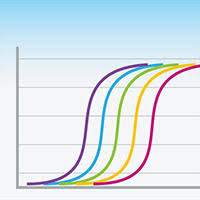Announcement from the Wisconsin Veterinary Diagnostic Laboratory (WVDL)
 The WVDL has completed the validation of new multiplex real-time PCR assay for the detection of Mycobacterium avium ss. paratuberculosis (MAP) in accordance with the American Association of Veterinary Laboratory Diagnosticians (AAVLD) guidelines. WVDL has improved the specificity and sensitivity of the assay for all species routinely tested including for bovine, caprine, ovine and exotic samples. This multiplex real-time PCR assay uses three targets, which minimizes the possibility of cross-reaction with other Mycobacterium avium complex members thereby increasing MAP detection specificity. The validation data showed that only a very a small number of exotic samples (< 0.01%) cannot be resolved using the multiplex PCR. In those situations, the WVDL reports the MAP PCR result as “undetermined”, with the additional recommendation of retesting the animal within the next 6 months. If you have any questions, please feel free to contact the Microbiology Molecular Section at the WVDL by phone at 608-262-5432, by email at info@wvdl.wisc.edu or at our website.
The WVDL has completed the validation of new multiplex real-time PCR assay for the detection of Mycobacterium avium ss. paratuberculosis (MAP) in accordance with the American Association of Veterinary Laboratory Diagnosticians (AAVLD) guidelines. WVDL has improved the specificity and sensitivity of the assay for all species routinely tested including for bovine, caprine, ovine and exotic samples. This multiplex real-time PCR assay uses three targets, which minimizes the possibility of cross-reaction with other Mycobacterium avium complex members thereby increasing MAP detection specificity. The validation data showed that only a very a small number of exotic samples (< 0.01%) cannot be resolved using the multiplex PCR. In those situations, the WVDL reports the MAP PCR result as “undetermined”, with the additional recommendation of retesting the animal within the next 6 months. If you have any questions, please feel free to contact the Microbiology Molecular Section at the WVDL by phone at 608-262-5432, by email at info@wvdl.wisc.edu or at our website.
Comment: Multiplex PCR assays are not new, but this is among the first reports that the assay has been validated and made routine in a veterinary diagnostic laboratory.
I have been involved in two situations where a commonly used commercial MAP PCR kit reported a positive result on zoological ruminants only to discover after more extensive testing that the animals had a strain of M. avium subsp. avium in their fecal sample that caused a false-positive MAP PCR kit result. The 3-target multiplex has been proven to avoid this potentially costly mistake. When a MAP diagnosis by conventional real-time PCR kit has large economic consequences, it is advisable to “get a second opinion” using this multiplex PCR assay, or simply start with this multiplex assay given that the cost is comparable to what most labs charge using the single genetic target PCR kits for MAP.
____________
For the very interested, here are some research reports on multiplex PCR assays for MAP:
- DV Cousins et al. Mycobacteria distinct from Mycobacterium avium subsp. paratuberculosis isolated from the faeces of ruminants possess IS 900-like sequences detectable by IS 900 polymerase chain reaction: implications for diagnosis. Molecular and Cellular Probes 13(6):431-442, 1999.
- T Tasara et al. Development and evaluation of a Mycobacterium avium subspecies paratuberculosis (MAP) specific multiplex assay. International Journal of Food Microbiology 104(3):279-287, 2005.
- S Rajeev. Evaluation of multiple genomic targets for identification and confirmation of Mycobacterium avium subsp. paratuberculosis isolates using real-time PCR. Veterinary Microbiology 105(3-4):215-221, 2005.
- D Herthnek and G Bölske. New PCR systems to confirm real-time PCR detection of Mycobacterium avium subsp. paratuberculosis. BMC Microbiology 6: article no. 87, 2006.
- SJ Shin et al. Efficient differentiation of Mycobacterium avium complex species and subspecies by use of five-target multiplex PCR. Journal of Clinical Microbiology 48(11):4057-4062, 2010.